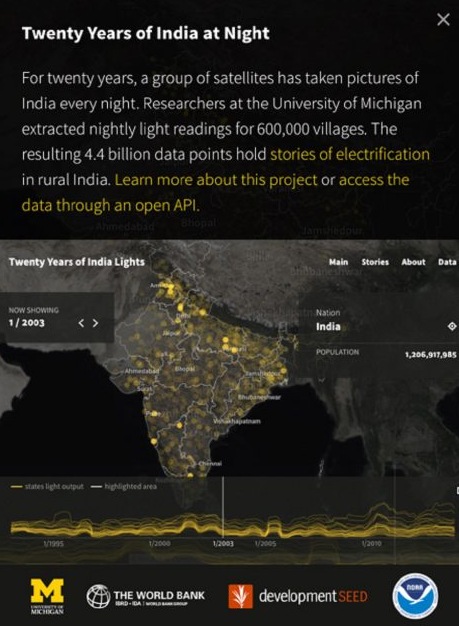A Global Survey of Energy Poverty from Space
Lost in the Dark: A Global Survey of Energy Poverty from Space

Measuring electricity access is an expensive and difficult undertaking, fraught with error and missingness. Leveraging computational analysis of remotely sensed data across thousands of nights, we generate indicators of electricity poverty across the globe at the settlement level, improving spatial resolution and filling in temporal gaps. We demonstrate the reliability and validity of these classifications against ground-based surveys at multiple scales. We estimate the energy poor population is 1.17 billion, 60% higher than the official global estimate of 733 million lacking electricity access. Most of the world’s energy poor live in areas that are more remote, less densely populated, and more rugged than energy abundant areas. The results clarify the obstacles that impede equitable access to sustainable and affordable energy and provide new data to improve the targeting of solutions to address energy poverty across the world.
Date and Time
Location
Hosts
Registration
-
 Add Event to Calendar
Add Event to Calendar
Loading virtual attendance info...
- 4901 Evergreen Rd
- Dearborn, Michigan
- United States 48128
- Click here for Map
- Contact Event Host
- Co-sponsored by Dr Wencong Su
Speakers
 Brian Min of University of Michigan at Ann Arbor
Brian Min of University of Michigan at Ann Arbor
Lost in the Dark: A Global Survey of Energy Poverty from Space
Measuring electricity access is an expensive and difficult undertaking, fraught with error and missingness. Leveraging computational analysis of remotely sensed data across thousands of nights, we generate indicators of electricity poverty across the globe at the settlement level, improving spatial resolution and filling in temporal gaps. We demonstrate the reliability and validity of these classifications against ground-based surveys at multiple scales. We estimate the energy poor population is 1.17 billion, 60% higher than the official global estimate of 733 million lacking electricity access. Most of the world’s energy poor live in areas that are more remote, less densely populated, and more rugged than energy abundant areas. The results clarify the obstacles that impede equitable access to sustainable and affordable energy and provide new data to improve the targeting of solutions to address energy poverty across the world.
Biography:
Dr. Brian Min is an Associate Professor of Political Science and Faculty Affiliate at the Michigan Institute for Data Science (MIDAS) at the University of Michigan-Ann Arbor. His research on nighttime satellite data and rural electrification has been widely cited in scholarly journals and the media. He is the author of Power and the Vote: Elections and Electricity in the Developing World (Cambridge University Press, 2015). Dr. Min has advised the United Nations Development Programme on its efforts to track progress towards its goals of sustainable energy for all. He is the scientific lead for the World Bank's Global Nightlights Project, which uses high resolution nighttime imagery and settlement location data to generate estimates of electricity
access for developing countries at an unprecedented level of spatial and temporal detail. He helps manage the Light Every Night data archive, an open‐access 250+ terabyte collection of all nighttime satellite imagery from VIIRS and DMSP‐OLS from 1992 to the present
Email:
Agenda
Main Event is from 12;30 PM to 1;30 PM
Thus attending in person - refreshments will be provided.
A Joint presentation of the ECE Research Seminar, Winter 2024 University of Michigan - Dearborn and IEEE Southeastern Michigan Computer Society Technical Chapter
Media
| Lost in the Dark: FLYER | Lost in the Dark: A Global Survey of Energy Poverty from Space | 142.95 KiB |

